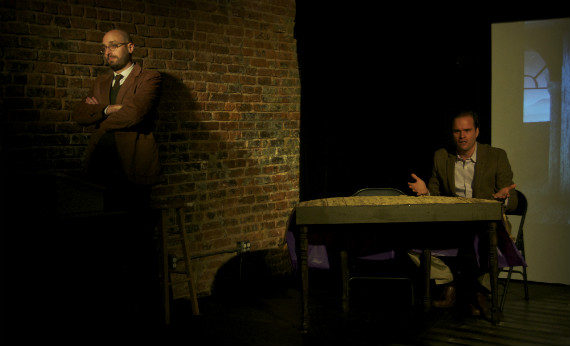
Regret can suffuse a storyline. It isn’t hard to see why: few among us have lived a life devoid of decisions we’d rather have made differently, and while speculation about other lives we may have lived isn’t the healthiest way to spend one’s day, I know of few people who have never engaged in such speculation. Craig Wright’s play The Pavilion engages directly in such a debate, though the question of where it stands remains up in the air for most of its two acts. (The play runs at the Producers Club Theatre in a production directed by Michael Kostroff through Sunday, November 22nd.) This is a work that covers both the quotidian and the cosmic, and the juxtaposition takes a conventional storyline to unanticipated places.
It opens with a talk on the nature of time by one of the play’s three characters. This is the Narrator (Jon Adam Ross), who sets the stage and takes on number of minor roles throughout the course of the play’s two acts. Between that and the minimal scenery, it’s safe to say that a certain beloved Thornton Wilder play is a touchstone here–albeit with a Midwestern and contemporary setting. (Side note: I saw this play not long after reading John Langan’s “How the Day Runs Down,” which also riffs on Wilder to describe a zombie outbreak. Said play provides a surprisingly versatile template.) The Pavilion’s setting–a historic pavilion, set to be demolished for an amphitheater–is located within Pine City, Minnesota, a town located outside of of the Twin Cities. Of the other two characters, one has never left their hometown, while one has found a successful professional life in the city; the gulf between these two options looms large throughout the scenes that follow.
While the Narrator’s dialogue tends towards the metaphysical and the omniscient–this is, after all, a play that opens with the history of the universe, and at one point finds the Narrator asking for a few different skies to be tried out as a scenic background–Ross’s delivery of it is ebullient. At times, it suggests a professor with a fondness for pot and a contagious enthusiasm, helping to bridge the gaps between the play’s metaphysical mode and the emotional conflict at its center.
The play is set at a twenty-year high school reunion, to which Peter (Jeffrey Delano Davis) has returned from his career as a therapist in the Twin Cities. He’s hoping to reconcile with Kari (Ayesha Adamo), his high school girlfriend, who has a very understandable reason for preferring not to see him. A long give-and-take between the two extends for most of the play: Peter, feeling a general sense of disquiet and hoping for forgiveness and a reconciliation; Kari, aware of her stagnant marriage yet much more self-assured. It’s a familiar narrative, and one that, as it deepens, threatens to hit familiar beats. Someone in their late 30s contending that the love of their life was someone they met in high school is a trope we’ve heard before; it’s also a potentially worrisome one.
Where Wright takes this scenario, thankfully, is less expected. Both Davis and Adamo convey their characters well, the former with a lived-in discomfort that contrasts with his good looks and friendly demeanor, the latter with the ability to maintain an impassive facade, then let it down at a moment’s notice. Credit should also go be given to Ross for channeling numerous former classmates of the two, some of whom have opted for decidedly eccentric belief systems. Much like the Narrator’s own delivery of certain sentiments, Wright allows for moments of comedy and surrealism to creep in at unexpected places. Much like the moving, wordless gesture that draws it to a close, this play is cognizant of its own boundaries, and efficiently blends comedy, philosophical speculation, agency, and pathos into a compelling whole.
Photo:Melissa X. Golebiowski
Follow Vol. 1 Brooklyn on Twitter, Facebook, Google +, our Tumblr, and sign up for our mailing list.
